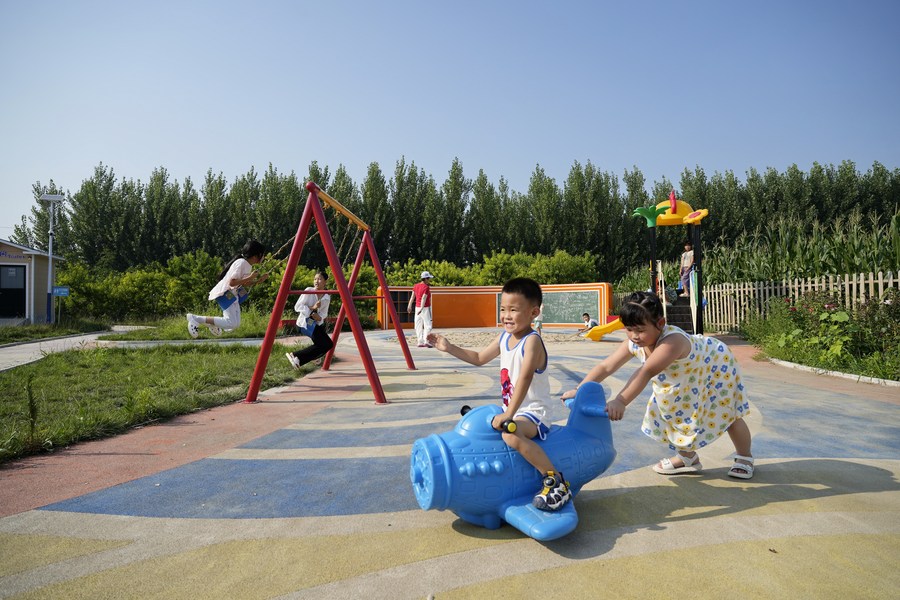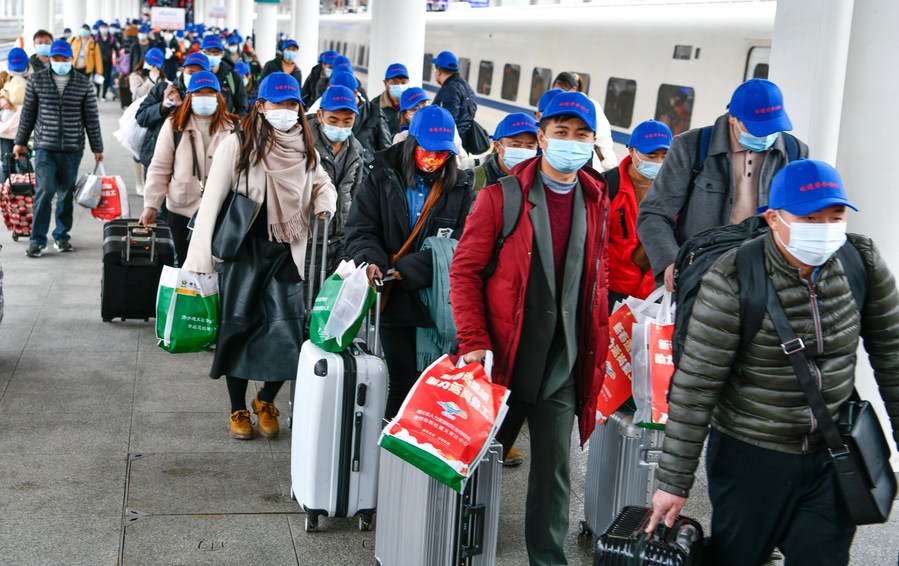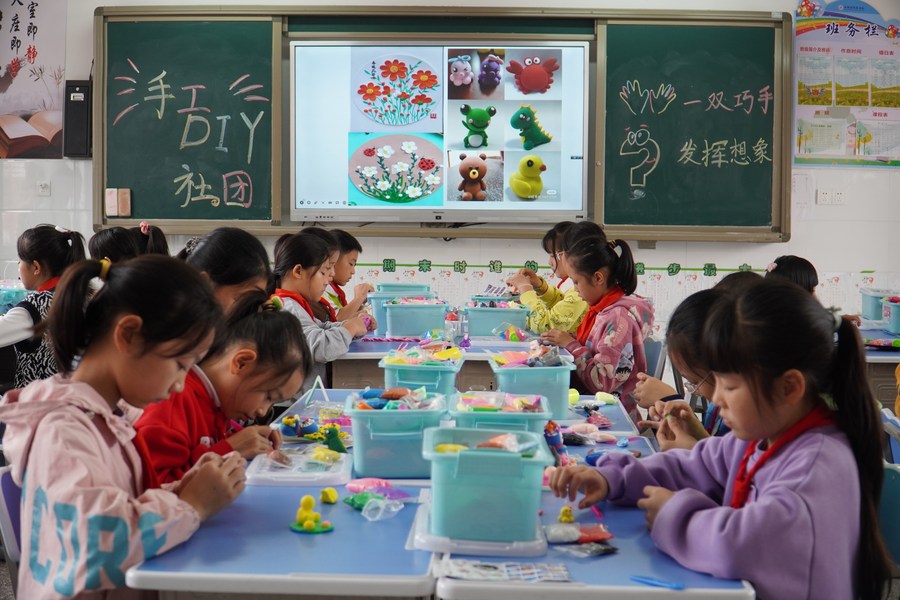
Children play at a park in Zhaoxinzhuang Village, Fengnan District, Tangshan City, north China's Hebei Province, July 19, 2023. (Xinhua/Mu Yu)
Nine-year-old Xiao Xing (pseudonym) only shook his head when asked where his home was, making it evident he did not have a clear answer.
He is currently spending his summer break with his grandmother in their native village Qinghaoyan in Linxian County, located in north China's Shanxi Province. But they are residing with relatives, as their own dwelling which they left some years ago has become totally uninhabitable.↳
During the school year, Xiao Xing and his grandmother stay in a rented apartment in the county seat where his grandfather works.↳
Xiao Xing is a left-behind child. His parents divorced when he was a toddler and both of them left home to work in faraway cities. Like many other children in the village, he had to leave home at school age, "because there's no decent school or kindergarten in the village," his grandmother said.↳
The county seat of Linxian offers better schooling for children, as well as job opportunities for their caregivers. Xiao Xing's grandparents can both earn some money by working as a janitor or a cleaner.↳
Left behind yet floating, many rural children like Xiao Xing are struggling to adapt themselves to the constant changes in their lives such as coping with parental absence from a tender age, navigating the overwhelming rhythm of urban life, and wrestling to find a coherent sense of identity in their later years.↳
Starting in the 1980s, large crowds of the surplus rural population have migrated to cities for work, earning a better income for themselves, boosting urban economic growth and accelerating the country's urbanization.↳
Last year, China's migrant worker population reached 295.62 million, an increase of 3.11 million over the previous year. They earn an average of 4,615 yuan (about 666.52 U.S. dollars) per month, up 4.1 percent year on year, according to a report released by the National Bureau of Statistics.↳
WIDER GAP IN EDUCATION↳
Decades after China's urbanization drive, rural counties have developed into modern cities and townships into boom towns. But certain remote villages in the hinterlands have seen a wider gap in the quality of school education. A decrease in the population has even led to the closure or merger of local schools with larger ones, forcing some left-behind children to leave their homes and join the "floating population."↳
Zhang Qin (pseudonym) grew up with her grandparents as a left-behind child in a small village in southwest China's Sichuan Province. Now in her 30s, she has discovered the cyclical nature of events. Working as a migrant worker in Guangzhou, she has to send her own son to school in her home county in Sichuan.↳
"The school at the county seat is not bad and his grandparents can keep an eye on him," she said. "Here in Guangzhou, it's too difficult to get admitted to a good school, and we are too busy to take care of him."↳

A student makes model airplanes with the help of his teacher at Furong school in Sangzhi County, central China's Hunan Province, Nov. 11, 2022. (Xinhua/Zhang Ge)
Rao Nianjin, 69, rents a room in Zengtian Township of Le'an County in east China's Jiangxi Province, where her two granddaughters attend school. All three live together in a small space covering less than 15 square meters.↳
"The rent, food, water and electricity add up to at least 1,000 yuan a month," said Rao, who has no income herself. To cut spending, they would return home to the countryside as soon as school vacation starts.↳
Children who have no grandparents can only go to boarding schools. "It's tough, especially for first-graders," said Du Xiaolin, a teacher at a boarding school for left-behind children in Linxian County in Shanxi Province.↳
Due to a lack of parental love and discipline, he said many children encounter behavioral problems, become reserved and experience a sense of loneliness. "They long for extra attention and love from their teachers."↳
Compared with their peers, such rural children tend to fear going to school and feel less confident in themselves, said Du Haifeng, a professor at Xi'an Jiaotong University's School of Public Policy and Administration.↳
Prof. Du's team has conducted a study on left-behind schoolchildren in two counties in the northwestern Shaanxi Province. They focused specifically on children who had to leave their homes in the countryside and move to a new environment to study.↳
"Many children find it difficult to adapt to their new life and feel helpless as their parents are too far away," said Prof. Du, cautioning about potential psychological problems in the longer term.↳
Navigating the complexities of social interaction, conflict resolution, and safeguarding against bullies become an even greater ordeal for them, according to a police official from a southwest China community primarily comprising elderly residents and young children resettled from impoverished villages in the nearby countryside.↳
"In the village, everyone knows each other and interpersonal problems are easier to solve. In the new urban community, the elderly people themselves struggle to survive and can do little to help their grandchildren," he said on condition of anonymity.↳
The psychological problems of children are sometimes not easily noticeable. Dong Fengliang, a primary school teacher, recounted an incident from the previous year in which a sixth-grade student, seemingly healthy and academically proficient, attempted self-harm in the classroom.↳
Among the prevalent issues identified by Prof. Du and his team among these left-behind or "floating children" are road safety concerns, video game addiction, and misdemeanors such as theft.↳
"We want to draw public attention to their special needs and push for adequate solutions," said Han Jialing, a researcher with the Beijing Academy of Social Sciences who has followed the well-being of migrant and left-behind children for many years.↳

Migrant workers wait to get on a special train at Zunyi Station in Zunyi, southwest China's Guizhou Province, Feb. 8, 2022. (Xinhua/Yang Wenbin)
Calling for sustained efforts to improve rural education, Han said she is against the merging and closing of village schools with fewer children. "The children are our future and we need to build better schools in the countryside, instead of forcing them to leave home."↳
Beijing-based education specialist Xiong Bingqi, however, said the key would be to grant all migrant children equal access to education in the same city where their parents work.↳
On the other hand, Prof. Du noted that it is equally important to create more jobs in small cities and counties and encourage migrant parents to move closer to their families so as to take better care of their children.↳
"We need a system of coordinated social support," said Zhou Yuhong, a social worker in Kaili City in southwest China's Guizhou Province. "And that calls for concerted efforts from the government, schools, families, communities, employers as well as social organizations."↳
A HELPING HAND↳
It's not just social workers and researchers who extend a helping hand to left-behind children. Across China, many people share a genuine concern for the well-being of this special group of children.↳
Over the past two decades, universities nationwide have collaborated with schools in underdeveloped regions, dispatching volunteers to illuminate the paths of rural children who yearn for knowledge and aspire to venture beyond the confines of their villages.↳
More than 500 students of Jilin University of Finance and Economics in northeast China regularly hold online meet-ups with primary and middle school children from remote rural areas, boosting their morale with words of encouragement and providing concrete counseling.↳

Students make handicrafts at Cuiying school in Sangzhi County, central China's Hunan Province, Nov. 12, 2022. (Xinhua/Zhang Ge)
For years, volunteers from Northeast Normal University have been providing free tutorial services for left-behind children in rural areas as well as migrant children in cities.↳
During the ongoing summer vacation, many local governments, NGOs and volunteers have organized day trips, free art and music classes, and sports sessions for left-behind children.↳
Liu Xinyan, a third grader from a rural school in Yitong Manchu Autonomous County of Jilin Province, expressed her delight over the "impressive" nature of such initiatives. A mere fortnight ago, she and 23 other left-behind children were invited to a natural history museum in the provincial capital Changchun.↳
"I used to see dinosaur fossils in books, and for the first time, I've seen real fossils," Liu said.
The trip was aimed at enriching the life of such children, who would otherwise spend most of their time unsupervised or playing video games, said Liu Zhilin, a volunteer who accompanied the group.